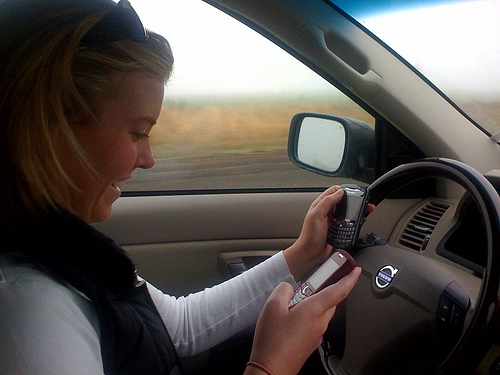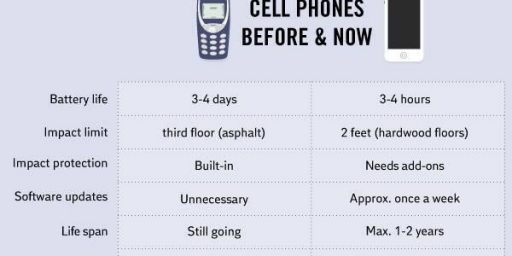States Bar Teen Drivers Using Cell Phones
More than a dozen states have or are considering laws to ban teens from using cell phones while driving, despite any evidence that cell phones are actually more dangerous than unbanned activities.
States Bar Teen Drivers Using Cell Phones (AP)
There are a few things that the average teenager absolutely must have in 21st century America—a license to drive is one, a cell phone is another. But police officers, parents, and, increasingly, lawmakers are coming to the conclusion that those essentials are a dangerous mix when combined with inexperience on the road. A growing number of states are creating legal barriers to keep young drivers from using cell phones, even as few ban adults from talking — at least handsfree — while driving. “It’s not a silver bullet solution, but it’s one piece of a puzzle we need to put in place if we’re serious about eliminating highway deaths, highway crashes, as the No. 1 cause of death of young Americans,” said Maryland Delegate William Bronrott.
The year began with just two states limiting cell phone use for teen drivers. But as legislative sessions moved ahead, lawmakers in six states passed bills to bar all cell phones, handheld or handsfree, for teenage drivers with learner permits or provisional licenses. Now, laws in Colorado, Connecticut, Delaware, Maryland and Tennessee say young drivers must keep the phone off. Illinois’s measure is waiting for Gov. Rod Blagojevich to sign it into law, but his staff says he intends to. Maine already bars cell phones for drivers with provisional licenses up to age 21, and New Jersey bans them for those drivers at any age.
At least a dozen more states considered similar measures in recent months and balked, though advocates say they’ll be back.
[…]
Whether or not they’re using cell phones, teenagers are much more likely than older drivers to get into accidents. At age 16, boys get into 27 crashes per million miles driven and girls 28 crashes. Those numbers drop quickly as drivers age. By the time drivers reach the 20-to-24-year-old group, there are eight crashes per million miles for men, and nine crashes for women, according to the Insurance Institute for Highway Safety, based on 2001 data. Those crashes take a deadly toll. The insurance institute says that 32 16-year-olds died per 100,000 drivers in 2003, four times the fatality rate of the 30-to-59 age group.
Researchers say there is clearly a problem with teenage drivers becoming easily distracted on the road. Their work has bolstered efforts to ease teenagers into the driving world, giving them more time to learn, restricting nighttime driving and barring other teenage passengers, who sometimes incite dangerous behavior. Now 45 states have some version of what’s called graduated drivers licenses.
But many researchers say convincing evidence is lacking on any link between cell phone use and accidents—even with academic studies like one published last winter that found young motorists talking on cell phones react as slowly as senior citizens, and are more impaired than drunk drivers.
That cell phones are incredibly distracting is something that everyone “knows” even though there does not seem to be any particular evidence for it. I must admit that a substantial number of the people I witness doing incredibly dumb things on the road are holding a cell phone. How many of those not holding cell phones who are eating, fiddling with their radios, or doing other things is less obvious since those activities are less visible.
Related:
Northeast Has Dumbest Drivers
Man Passes Driving Test After 272 Tries
Air Travelers Say No to Cell Phones
Drivers on Cell Phones Slower than Geezers and Drunks
Big Changes Coming for Cellphone Industry
Blackberry or Crackberry?
A Phone You Can Actually Type On – Finally
U.S. Behind in Wireless
Cell Phone Trackers
FCC to Consider Allowing Cell Phones on Flights
Exploding Cell Phones
Schools Relax Cellphone Bans
Driving While DVD̢۪ing
DC Bans Cell Phones . . . and Other Stuff
DC BANS CELL PHONES
CELL NUMBER PORTABILITY





